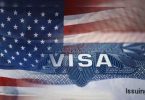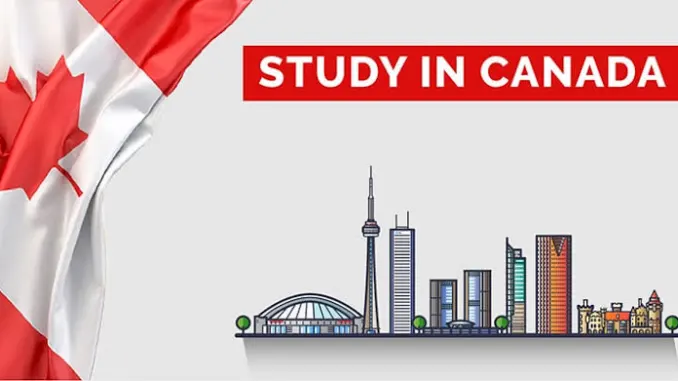Canada is well recognized for its exceptional education system, characterized by its high quality and global reputation. Additionally, the country is celebrated for its cultural diversity, which contributes to a rich and inclusive learning environment. Moreover, Canada is known for its hospitable atmosphere, making it an attractive destination for foreign students. Each year, a considerable number of students from various countries opt for Canada as their preferred destination for pursuing higher education. This choice is driven by the desire to avail themselves of the exceptional academic institutions, abundant research prospects, and the opportunity to engage with a diverse and multicultural culture. In order to pursue studies in Canada, international students are required to get a study permit, often referred to as a study visa. This article aims to examine the qualifying criteria and conditions for obtaining a study visa for Canada, facilitating the pursuit of an enriching educational experience in the northern region known as the Great White North.
The eligibility criteria for obtaining a study visa in Canada.
Acceptance Letter from a Designated Learning Institution (DLI)
The primary prerequisite for obtaining a study visa in Canada is the receipt of an acceptance letter from a Designated Learning Institution (DLI) inside the country. DLIs are accredited by the respective province or territory governments and provide a diverse range of academic programs for study. It is imperative to verify the availability of the desired program at a Designated Learning Institution (DLI), as enrolling in a non-DLI may render one ineligible for a study visa.
Adequate Financial Resources
It is imperative to provide evidence of possessing the financial resources to meet the costs associated with school fees, living expenses, and return transportation. The precise quantity fluctuates based on the duration and geographical location of the study program. One may provide evidence of their financial capabilities from a range of sources, including bank statements, scholarships, or financial assistance received from a sponsor.
Individual Criminal Record
In order to ascertain that they do not present a security threat to Canada, individuals applying for a particular opportunity are required to furnish a police clearance certificate or a certificate of good behavior from their place of origin.
Good Health
Students studying in Canada may be obligated to undergo a medical evaluation conducted by a designated healthcare professional in order to ascertain their compliance with the health criteria set out by the country. Certain medical issues might render an individual ineligible for admission, hence resulting in the denial of their application for a study visa.
Letter of Intention to Leave Canada Following Completion of Academic Program
It is imperative to effectively persuade the Canadian immigration authorities of one’s genuine intention to depart from Canada upon the successful completion of academic pursuits and afterwards returning to one’s place of origin. The presentation of robust connections to one’s nation of origin, encompassing factors such as familial bonds, economic opportunities, or property ownership, can serve to bolster one’s argument or position.
The process of applying for a Canada study visa
Compile the necessary documentation
In order to begin the application process for a student visa in Canada, it is important to possess the following requisite documents:
a. A passport that meets the necessary requirements and is recognized as legitimate by the appropriate authorities.
b. The official letter of acceptance issued by a Designated Learning Institution (DLI), indicating the individual’s admission to a specific academic program.
c. Documentation demonstrating the availability of enough financial resources to cover the expenses associated with studying and living in the designated country.
d. Photographs that adhere to the specified dimensions and criteria for passport identification purposes.
e. Statement of Purpose (SOP) elucidating one’s educational and professional aspirations.
f. Academic transcripts and certificates are essential documents that provide a comprehensive record of an individual’s academic achievements and qualifications. These records serve as official documentation of completed courses, grades earned, and degrees or certifications obtained. They are commonly used by educational institutions, employers
g. Scores from language proficiency tests such as the International English Language Testing System (IELTS) or the Test of English as a Foreign Language (TOEFL).
h. A certificate issued by the police indicating that the individual has no criminal record.
i. Results from a medical examination, if it is a requirement for the application.
j. A form (IMM 5645) including information on the applicant’s family.
k. A receipt confirming payment of the visa application cost.
The application process can be completed either online or by visiting a Visa Application Center (VAC).
The application process for a study visa in Canada can be completed electronically via the official website of Immigration, Refugees, and Citizenship Canada (IRCC), or alternatively, through a Visa Application Center (VAC) located in the applicant’s place of residence. It is imperative to meticulously and truthfully fill out the application, as any form of deception might result in a denial of the application or potential issues in future immigration matters.
Biometrics appointment.
Individuals may be obligated to furnish biometric data, such as fingerprints and a photograph, at a nearby Visa Application Center, contingent upon their country. Biometric data, typically retained for a duration of ten years, may obviate the need for resubmission in the context of Canadian visa applications, provided that such data has been previously furnished.
Participate in Interview
In some instances, individuals may be required to participate in an interview at their respective Canadian embassy or consulate. The interview process affords visa authorities the chance to analyze the authenticity of your plans to pursue studies in Canada and assess the reliability of your application.
Wait for data processing to be completed.
The duration of study visa processing is subject to variation based on the individual’s country of residency. It is important to submit your application well in advance of your desired commencement date for studies, since the processing duration might extend to several weeks or even months during seasons of high demand.
Decision and Next Steps
Upon the approval of your study visa application, you will be issued a Port of Entry (POE) Letter of Introduction, granting you permission to travel to Canada. Upon arrival, it is necessary for individuals to undertake a health assessment and produce a letter of documentation to the immigration officer. Subsequently, the immigration officer will proceed to grant the study permit. In the event that your application is denied, you will be provided with a written correspondence that delineates the grounds for the rejection.
Tips and Strategies for an Effective Study Visa Application
Early Application: It is advisable to submit your application in advance. It is advisable to begin the application procedure well in advance of the desired commencement of studies in order to ensure ample time for processing.
Emphasize Honesty: Ensure the provision of precise and sincere information in both your application materials and interview sessions. Visa refusal may occur as a consequence of any discrepancies or dissemination of inaccurate information.
Demonstrate Financial Capacity: Provide compelling evidence of your financial capability to meet the financial obligations associated with tuition fees and living expenses over the whole course of your chosen academic program.
Demonstrate Firm Connections to Country of Origin: Substantiate the existence of substantial factors that would compel your return to your country of origin subsequent to the culmination of your academic pursuits, including familial, occupational, or property-related associations.
Prepare for the Interview: Prior to the interview, it is advisable to make necessary preparations, including examining your study plans and developing the ability to effectively communicate your objectives for pursuing studies in Canada, should it be required for the visa interview.
Conclusion
Acquiring a Canadian study visa provides access to a high-quality educational system and an unparalleled cultural immersion opportunity. By comprehending and satisfying the established requirements and meticulously organizing your application, you might commence a profound educational expedition in one of the globe’s most hospitable and multicultural nations. It is advisable to submit your application in a timely manner, ensuring that your statements are accurate and reflective of your sincere desire to pursue studies in Canada. By implementing effective strategic planning and thorough preparation, individuals may transform their aspirations of pursuing higher education in Canada into tangible achievements, therefore enhancing their personal growth via invaluable cross-cultural encounters.






